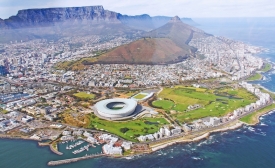africa

How South Africa uses soft power in foreign policy to maintain regional hegemony amidst a troubled economy and government.
Germany's Marshall Plan with Africa received a lot of praise but also criticism [...] The so-called "Marshall Plan” - drawing a direct parallel to the huge United States program that kick-started the ravaged German economy after World War Two - talks about a new level of development cooperation. The plan foresees a complete restructuring of the German economic cooperation with Africa.
China’s involvement and investment in Africa have intensified in the past few years eliciting a lot of focus and research on China-Africa relations. While this can be written off by some as simply investment [...] China’s growing involvement in the media industry in Africa and South Africa has been seen by Trans-Atlantic nations to be a challenge to their influence in Africa.
The Indian High Commission will hold a “Festival of India-Matri” from January 25 to March 15, 2017 to commemorate 60 years of a strong bond of friendship between India and Ghana. [...] He said the festival to be held in Accra, Takoradi, Cape Coast, Kumasi and Koforidua would showcase multifaceted aspects of Indian culture in its various colours and forms.
From a digital perspective, 2016 has arguably been the year of emotions running high [...] The fact that people are emotional beings is hardly a secret, of course, especially when tragedies or high-stakes political affairs are involved. What digital platforms have brought to the table is a rather new form of commodification of human emotions as instruments of social exchange.
China's Foreign Minister Wang Yi is currently on a tour across Africa, where he is busy shaking hands with dignitaries and posing for photo ops, . Wang's New Year's visits to the African continent are almost a tradition, this time he is in Madagascar, Tanzania, Zambia, Congo and Nigeria. Zambia wants to become a transport and logistics hub in southern Africa and Wang has promised help. [...] China is investing heavily in Africa.
Africa has been the centre of Nigerian foreign policy as a regional power and by attachment to several fundamental principles, including her unity and independence, capability to exercise influence in the region, peaceful settlement of disputes [...] There was however the need for a robust policy instrument to achieve these aims and which undoubtedly needed constant review to match the dynamics of the ever changing world and global politics.
Ethiopia and Sudan enjoy a well established historical relationship that dates back to the civilizations of Axum and Meroe states. This historic relation exhibits age-old political, economic, social and cultural bond that resulted in bolstering the dynamic relations. This relation is one of the several strong bilateral relations Ethiopia has been cultivating diligently with the neighboring nations over years.







